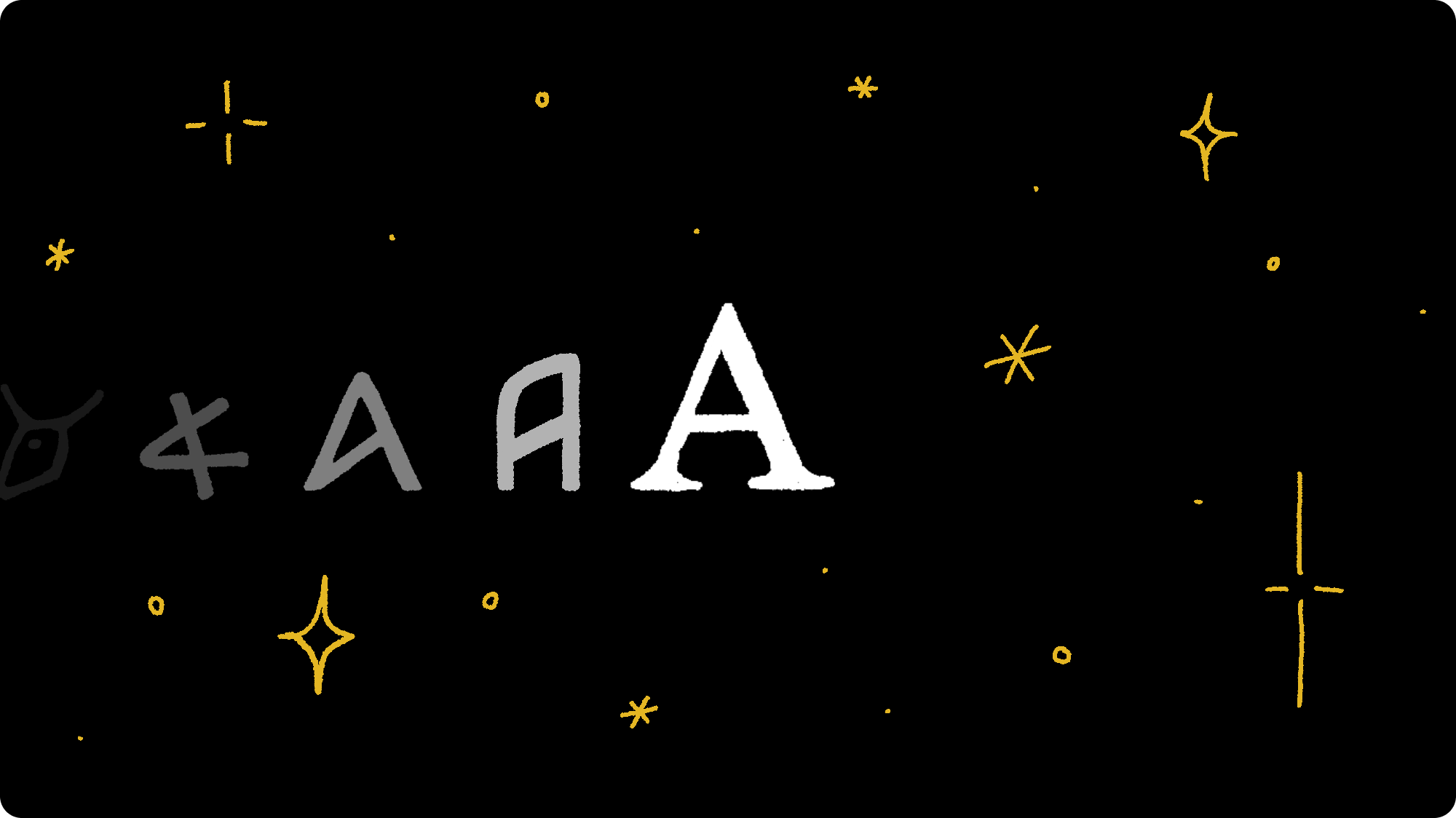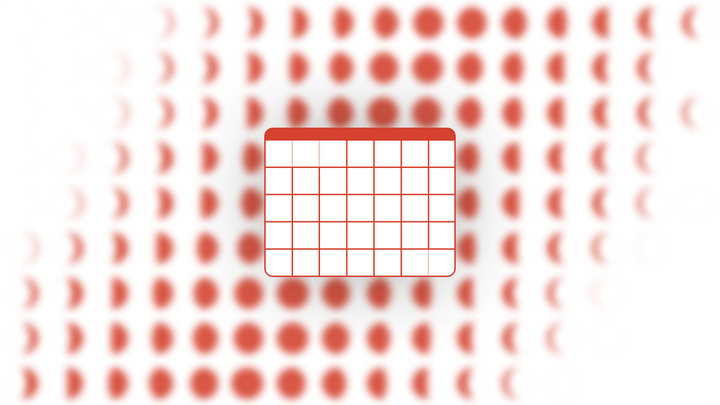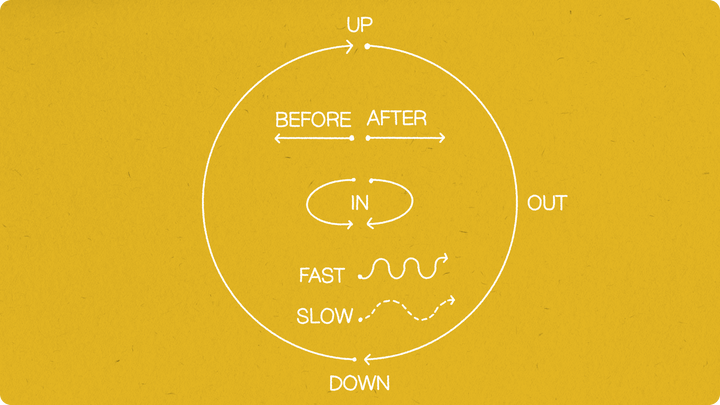The Good Without The Bad
"When it is understood that trying to have good without evil is as absurd as trying to have white without black, all that energy is released for things that can be done."
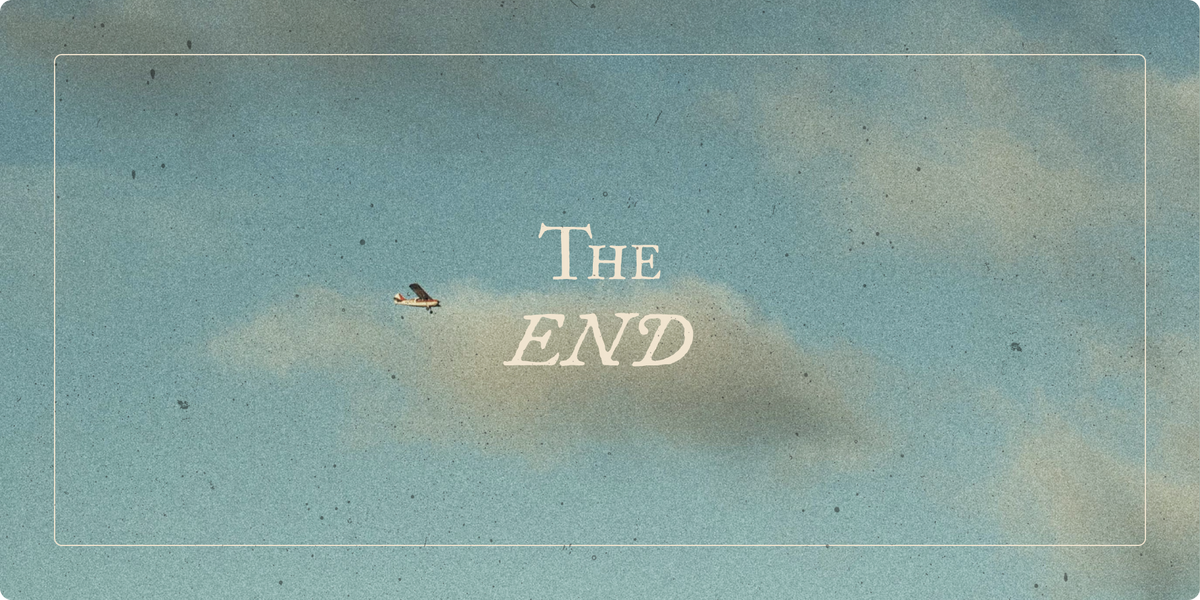
I've been noticing this tendency we have of wanting the good without the bad in many —if not all— aspects of life. No good can exist without its opposite: typically, by producing an equal consequence or by coming to an unavoidable end.
"When it is understood that trying to have good without evil is as absurd as trying to have white without black, all that energy is released for things that can be done."
—Alan Watts
A familiar metaphor for this can be borrowed from principles of physics. For every action, there is an equal and opposite reaction [1]. If a curve goes up a certain amount it will certainly come right back down at some point. It's a cycle of transfer of forces. Up, down. High, low. Outward, inward. There is no isolated force. They always come in pairs. And it's fair to say that the actions and creations we humans contribute to the world are all forces.
Nothing exists in a vacuum. Everything is a constant oscillation between light and dark, fills and gaps, silence and noise, good and bad.
Creation Produces Consequences
When you invent something, you also invent the accident of that thing. For example, inventing the car also meant inventing the car accident. However, we didn't invent the car because we wanted car accidents. These artificial things, our innovations, are automatically accompanied by opposite forces we cannot foresee.
Human creations, as they are ideated, are not meant to expire. Our instinct is to envision something that can grow forever, that can make a lasting dent in the world. So we actively ignore their consequences, and equally discount the fact that the good they bring might —or one day should— come to an end.
In technology, we want the ease of use of voice assistants without the intrusion of privacy. We want the magic factor of personalized algorithms without the tracking and the data hoarding. We want the "everything on the internet should be free" mentality, but not the ad-based business models. We want freedom of speech without the clickbait, the fake news and the blindshares.
In capitalism, we want instant delivery without the low wages and poor conditions of gig workers. We want the latest gadget without filling up the landfills. We want the possibility to accumulate wealth without the absurd proportions of the 1%. We want access to goods from across the globe without the transportation industry's carbon footprint.
The convenience of the good comes at great costs that we've become notoriously skilled at ignoring.
No Good Exists Without Evil
For every wave, there's a dip. These innovations and opportunities we create inevitably come with their downsides, their share of inequality. But if we just want the good parts, it's like we only want half of life.
"Man is the only creature that refuses to be what he is."
—Albert Camus
Without the deeps, how could we know to enjoy the highs? And what about the meaning, or learning we get from the lows once they're over? If life was only made of the good parts, would it even be life?
Why Risk It?
We want the good without the bad because fixing the bad means we risk losing the good. We create things for the good they can bring, not expecting their indirect consequences. So then we keep ignoring the bad just so we can keep enjoying the good.
If we were to repair all the unintended harm, some of the good would completely come apart. For example, services and conveniences we've come to expect would plain stop being possible if we were to entirely revisit our economy. Companies wouldn't have as much incentive to get you your package on a same-day delivery if there was a cap to the profit they could rake in per year. So we're stuck in this loop of not wanting to risk losing the good by fixing the bad.
But what about the good things we're already used to losing?
All naturally occuring things in our lives have expiry dates. Things come to an —often very dramatic— end, and we're surprisingly used to it. This is how we've come to make sense of our human experience.
To weave meaning from our experiences, we need that distance; the contrast between a high and its low or between a low and its high. Something to measure it against. We also often need a distance in time to make sense of things.
The Need for Distance
Meaning comes from endings. In everything we do, we gain new clarity on how it impacted our lives, how it made us grow, and our overall sentiment only when the thing is over and some time has passed. When you switch jobs, for example, your opinion, looking back, tends to vary greatly from what you were feeling when you still worked there. Same for when you move to a new neighbourhood, or just the general learnings and realizations you gain from growing out of childhood.
We never actually know what something means to us, in the grand scheme of our life, until it's gone, or finished. Human minds need that distance to make sense of things. It's a continuous cycle of experiencing, reflecting, and integrating.
Now, most things in life have a sort of expiry date, a deadline to them we know to assume. Relationships fade away, children grow up, people die, vacations end, circumstances change. We're used to living with that change and every change brings a new layer of meaning to our life. If we look at the big buckets that make up our lives; relationships, work, family, health, travel, these all come with the typical cycles we've come to expect just by being a human in society.
Interlude: The Internet Lacks Closure
Yet there's another, increasingly big bucket that's now an intricate part of our life that doesn't seem to have an end date in sight.
That's the Web.
This digital place that combines a parallel version of all your typical life buckets but never seems to stop to take a breath. The Web has come to fill all the remaining pockets of sense-making time we need to gather meaning from what happens in our life.
The always-on quality of the Internet has brought on a whole other paradigm for us to deal with. Reflection time now needs to be actively sought for by the more disciplined of us. Otherwise, you blink and six months have passed without you being able to recall what you've been feeling, what you've accomplished, and the people who were around to support you.
If the Internet is a game which has no end, then how can we weave meaning from it?
"Art or love gain shape and meaning for me only when they have ended."
—Matthew Stadler, The Internet lacks closure
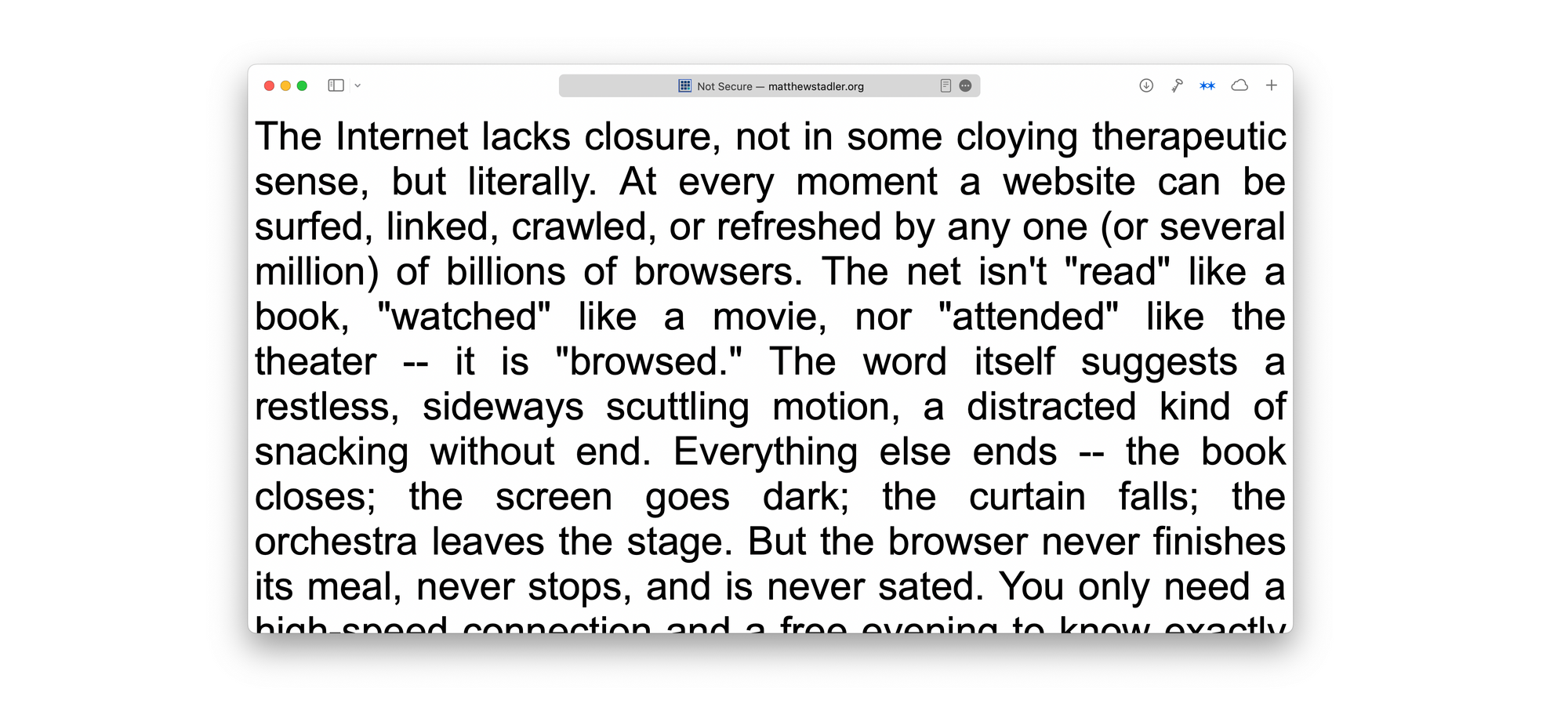
And not only the significance of the stuff that happens on the Internet, but the meaning of the Internet itself, as a token of human civilization. Will we ever get a chance to look back with some distance and truly apprehend it?
Now, all good (naturally occuring) things come to an end. Civilizationally-speaking, we've come to terms with death at this point. Death. If this doesn't show how resilient we can be as a species, I dont know what would.
Yet we can't seem to be nearly as accepting of the potential end of our artificial creations. Those infinite games we create like the Internet or even capitalism (there's another good with a lot of bad but no end for the foreseeable future, just growth, growth, growth).
In the Bad Lies Potential
It's like we're not able to be fully accountable for our actions when we don't approve of the inevitable reactions that occur or when we haven't planned or calculated them prior. Is it about shame? Regret? We think we should've known better? How could we? That, too, is an innate part of life; not knowing what the future holds. It is impossible for us to know what will come of our actions. Only to a certain extent, yes, but we can't appreciate the entirety of the consequences. It is fundamentally human to do things without knowing how the forces we apply will impact the world.
We have no control over the future, but that's not a reason to perpetually ignore the consequences of our creations. Let's instead treat our artificial goods —the things and systems we create— just as we do natural things that come to an end. Maybe we won't have online shopping forever as we know it today in 2022. But who knows what the future holds for this industry if we don't face reality and welcome the challenge of fixing the bad while, if we're lucky, keeping some of the good too.
Why is there so much reluctance to revisit our systems? Who knows what we've been overlooking while shoving all the bad under the rug? What if the very problems we're ignoring hold the seeds of further innovation to our solutions? The seeds of potential for prototypes that stand a chance at keeping the better parts of the good while eradicating the worst of the bad? The seeds of something more sustainable, moderate and fair? Creation of good means creation of bad. And in the bad too lies potential.
Photo by Majestic Lukas on Unsplash

